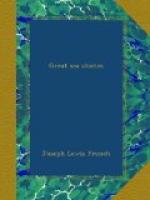The damaged ship was at this time on our weather-quarter; we accordingly handed the fore-topsail, and presently she was alongside. We hailed her, that we intended to send a boat on board, and desired her to heave-to, as we did, and presently she rounded to under our lee. One of the quarter-boats was manned, with three of the carpenter’s crew, and six good men over and above her complement; but it was no easy matter to get on board of her, let me tell you, after she had been lowered, carefully watching the rolls, with four hands in. The moment she touched the water, the tackles were cleverly unhooked, and the rest of us tumbled on board, shin leather growing scarce, when we shoved off. With great difficulty, and not without wet jackets, we, the supernumeraries, got on board, and the boat returned to the Torch. The evening when we landed in the lobster-box, as Jack loves to designate a transport, was too far advanced for us to do anything towards refitting that night; and the confusion and uproar and numberless abominations of the crowded craft, were irksome to a greater degree than I expected, after having been accustomed to the strict and orderly discipline of a man-of-war. The following forenoon the Torch was ordered by signal to chase in the south-east quarter, and, hauling out from the fleet, she was soon out of sight.
THE MERCHANTMAN AND THE PIRATE
From “Hard Cash,” BY CHARLES READE
North Latitude 23 1/2, Longitude East 113; the time March of this same year; the wind southerly; the port Whampoa in the Canton River. Ships at anchor reared their tall masts, here and there; and the broad stream was enlivened and colored by junks and boats of all sizes and vivid hues, propelled on the screw principle by a great scull at the stern, with projecting handles for the crew to work; and at times a gorgeous mandarin boat, with two great glaring eyes set in the bows, came flying, rowed with forty paddles by an armed crew, whose shields hung on the gunwale and flashed fire in the sunbeams; the mandarin, in conical and buttoned hat, sitting on the top of his cabin calmly smoking Paradise, alias opium, while his gong boomed and his boat flew fourteen miles an hour, and all things scuttled out of his celestial way. And there, looking majestically down on all these water ants, the huge Agra, cynosure of so many loving eyes and loving hearts in England, lay at her moorings; homeward bound.
Her tea not being yet on board, the ship’s hull floated high as a castle, and to the subtle, intellectual, doll-faced, bolus-eyed people, that sculled to and fro, busy as bees, though looking forked mushrooms, she sounded like a vast musical shell: for a lusty harmony of many mellow voices vibrated in her great cavities, and made the air ring cheerily around her. The vocalists were the Cyclops, to judge by the tremendous thumps that kept clean time to their




